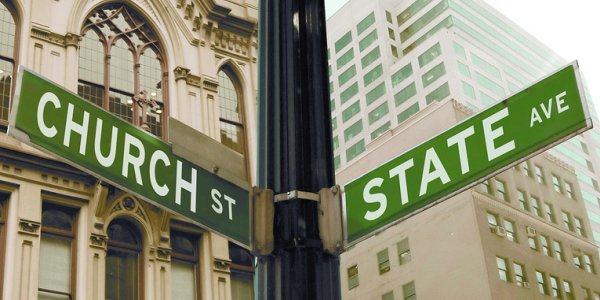After King Henry VIII broke from Rome in 1534, England began enforcing Anglican religious uniformity. Some wanted to purify the Anglican Church from the inside, being given the name “Puritans.” Others separated themselves completely from the Anglican Church as dissenters. Of those were Thomas Helwys, John Murton and John Smyth, who founded the Baptist faith in England.
Thomas Helwys wrote “A Short Declaration of the Mystery of Iniquity,” 1612, considered the first English book defending the principle of religious liberty: “Queen Mary … had no power over her subjects consciences … neither hath our Lord the King … power over his subjects consciences. … The King is a mortal man, and not God, therefore he hath no power over the mortal soul of his subjects to make laws and ordinances for them and to set spiritual Lords over them. …”
He continued: “If the King’s people be obedient and true subjects, obeying all humane laws made by the King, our Lord the King can require no more: for men’s religion to God is betwixt God and themselves; the King shall not answer for it, neither may the King be judge between God and man.”
Thomas Helwys was arrested and thrown into London’s notorious Newgate Prison, where he died in 1616.
Another Baptist dissenter, John Murton, was locked in Newgate Prison as punishment for spreading politically incorrect religious views. Prisoners were not fed, but instead relied on charity of friends to bring them food, such as bread or bottles of milk.
Roger Williams referred to John Murton in his work, “The Bloody Tenet (Practice) of Persecution for the Cause of Conscience,” 1644: “The author of these arguments against persecution … being committed (a) prisoner to Newgate for the witness of some truths of Jesus … and having not use of pen and ink, wrote these arguments in milk, in sheets of paper brought to him by the woman, his keeper, from a friend in London as the stopples (corks) of his milk bottle. … In such paper, written with milk, nothing will appear; but the way of reading by fire being known to this friend who received the papers, he transcribed and kept together the papers, although the author himself could not correct nor view what himself had written. … It was in milk, tending to soul nourishment, even for babes and sucklings in Christ … the word of truth … testify against … slaughtering each other for their several respective religions and consciences.”
Williams wrote: “Persecution for cause of conscience is most contrary to the doctrine of Christ Jesus the Prince of Peace. … Enforced uniformity is the greatest occasion of civil war, ravishing of conscience, persecution of Christ Jesus in his servants.”
Roger Williams was a contemporary of John Bunyan, who wrote “Pilgrim’s Progress” while in prison for conscience sake. When the government sought to arrest Roger Williams for preaching religious liberty, he fled to Boston, Massachusetts, on Feb. 5, 1631.
To his dismay, Puritans in Massachusetts had begun enforcing Puritan religious uniformity. Supreme Court Justice Hugo Black wrote in Engel v. Vitale, 1962: “When some of the very groups which had most strenuously opposed the established Church of England found themselves sufficiently in control of colonial governments … they passed laws making their own religion the official religion of their respective colonies.”
A controversy raged among inhabitants of Massachusetts, between “a covenant of grace” versus “a covenant of works.” The “covenant of grace” leaders were Sir Henry Vane, Rev. John Cotton, Rev. John Wheelwright, and his sister-in-law, Anne Hutchinson.
Rev. John Wheelwright fled Puritan uniformity in Massachusetts in 1637 and founded Exeter, New Hampshire. Roger Williams was briefly the pastor a church till “notorious disagreements” caused the Massachusetts General Court to censor his religious speech. Upon hearing the sheriff was on his way to arrest him and send him back to England, Williams fled again, in freezing weather, January of 1636. For weeks he traveled alone till he was befriended by the Indians of Narragansett. He founded Providence Plantation, Rhode Island – the first place where the church was not controlled by state.
Roger Williams wrote in 1661: “I having made covenant of peaceable neighborhood with all the Sachems (Chiefs) and natives round about us, and having in a sense of God’s merciful providence unto me in my distress called the place Providence … a shelter for persons distressed of conscience.”
A historical plaque reads: “To the memory of Roger Williams, the Apostle of Soul Liberty, Founder of the State of Rhode Island and Providence Plantation.”
The reverse of the plaque reads: “Below this spot then at the water’s edge stood the rock on which according to tradition Roger Williams, an exile for the devotion to the freedom of conscience, landed. 1636.”
In 1638, Roger Williams organized the first Baptist Church in America.
A plaque reads: “The First Baptist Church, Founded by Roger Williams, AD 1638, The Oldest Baptist Church in America, The Oldest Church in this State.”
Physician John Clarke came to Rhode Island and founded another Baptist Church in Newport. Other dissenters arrived in Williams’ Rhode Island Colony, such as William Coddington, Philip Sherman, and Anne Hutchinson. Anne soon left again to settle in the Dutch settlement of the Bronx in New York City, where all her family was scalped and beheaded by raiding Indians in 1643. There was only one survivor, Anne’s nine-year-old daughter Susanna, who was taken captive. After several years, she escaped and married an innkeeper, Samuel Cole. Their descendants included three U.S. presidents.
The Governor of Massachusetts from 1636 to 1637 was Sir Henry Vane, who helped found Harvard. He supported the efforts of Roger Williams. Due to the “covenant of grace” versus “covenant of works” controversy, Governor Sir Henry Vane was not reelected, being replaced by John Winthrop.
In 1639, Sir Henry Vane returned to England where he backed the Puritan Revolution, led by Oliver Cromwell, though he did not support the Rump Parliament which beheaded Charles I.
During the brief English Commonwealth, Vane helped draft for Roger Williams the Patent for Providence Plantation, which was unique in that it did not acknowledge a king, and it guaranteed freedom of religion and conscience. Vane later defended the Patent on behalf of Roger Williams against a competing charter.
Roger William wrote of Vane in April of 1664: “Under God, the great anchor of our ship is Sir Henry Vane … an instrument in the hand of God for procuring this island.”
A statue of Sir Henry Vane is in the Boston Public Library with a plaque that reads: “Sir Henry Vane … An ardent defender of civil liberty and advocate of free thought in religion. He maintained that God, Law, and Parliament were superior to the King.”
The Plantation Agreement at Providence, Sept. 6, 1640, stated: “We agree, as formerly hath been the liberties of the town, so still, to hold forth liberty of conscience.”
The Government of Rhode Island, March 19, 1641, stated: “The Government … in this Island … is a Democracy, or Popular Government; that is to say, It is in the Power of the Body of Freemen orderly assembled.”
Roger Williams responded to Puritan leader John Cotton’s accusations by publishing “The Bloody Tenet (Practice) of Persecution for the Cause of Conscience and Mr. Cotton’s Letter Lately Printed, Examined and Answered in 1644.” In this, Williams first mentioned his now famous phrase, “wall of separation”: “Mr. Cotton … hath not duly considered these following particulars. First, the faithful labors of many witnesses of Jesus Christ, existing in the world, abundantly proving, that the Church of the Jews under the Old Testament in the type and the Church of the Christians under the New Testament in the anti-type, were both separate from the world; and that when they have opened a gap in the hedge, or wall of separation, between the garden of the church and the wilderness of the world, God hath ever broken down the wall itself, removed the candlestick, &c. and made his garden a wilderness, as at this day. And that therefore if He will ever please to restore His garden and paradise again, it must of necessity be walled in peculiarly unto Himself from the world, and that all that shall be saved out of the world are to be transplanted out of the wilderness of the world and added unto His Church or garden … a separation of Holy from unHoly, penitent from impenitent, Godly from unGodly.”
Do you find these posts helpful and informative? Please CLICK HERE to help keep us going!


